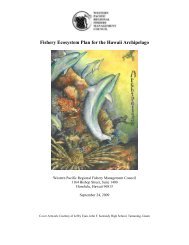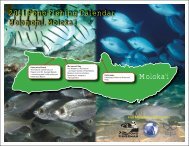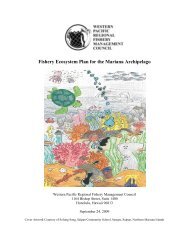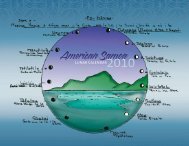Shark Depredation and Unwanted Bycatch in Pelagic Longline
Shark Depredation and Unwanted Bycatch in Pelagic Longline
Shark Depredation and Unwanted Bycatch in Pelagic Longline
You also want an ePaper? Increase the reach of your titles
YUMPU automatically turns print PDFs into web optimized ePapers that Google loves.
<strong>Shark</strong> <strong>Depredation</strong> <strong>and</strong> <strong>Unwanted</strong> <strong>Bycatch</strong> <strong>in</strong> <strong>Pelagic</strong> Longl<strong>in</strong>e Fisheries<br />
A3.7.3. Distribution of revenue from sharks<br />
Sokimi (Pers. comm., 1996) advised that <strong>in</strong> Fiji, as with most regional<br />
tune longl<strong>in</strong>e operations, dried shark f<strong>in</strong> is major supplement to the<br />
tuna longl<strong>in</strong>e fisherman’s earn<strong>in</strong>gs.<br />
Accord<strong>in</strong>g to Swamy (1999) <strong>and</strong> the <strong>in</strong>terview results, the crew is at<br />
liberty to process shark f<strong>in</strong>s <strong>and</strong> the proceeds from the sale of shark<br />
f<strong>in</strong>s do not go to the vessel owners, but are shared among the crew.<br />
However, the two Manag<strong>in</strong>g Directors that were <strong>in</strong>terviewed advised<br />
that the revenue goes to the “crew <strong>and</strong> company” <strong>and</strong> that they “do<br />
not encourage the crew to catch sharks”. They added that the proceeds<br />
go to both the crew <strong>and</strong> the company which is contradiction of the<br />
crews’ response.<br />
A3.7.4. Ex-vessel value of l<strong>and</strong>ed sharks<br />
There is a shark f<strong>in</strong> <strong>and</strong> meat <strong>in</strong>dustry operat<strong>in</strong>g <strong>in</strong> Fiji (Kailola,<br />
1995). Most of the shark products are exported, a small portion of<br />
the l<strong>and</strong><strong>in</strong>gs are distributed locally (Swamy, 1999).<br />
<strong>Shark</strong> f<strong>in</strong>s <strong>and</strong> tails are purchased by local shark f<strong>in</strong> traders. The value<br />
of the f<strong>in</strong> depends on the species, the type of f<strong>in</strong>, their completeness,<br />
<strong>and</strong> moisture content (a well-dried f<strong>in</strong> fetches a higher price). Dur<strong>in</strong>g<br />
1997, prices paid to local fishermen ranged from FJ$20 to 140 per<br />
kilogramme, the average price paid was FJ$60 (Swamy, 1999).<br />
Accord<strong>in</strong>g to the fishermen <strong>in</strong>terviewed for this study, the current<br />
market value for f<strong>in</strong>s <strong>and</strong> tail is FJ$60 to 200 per kilogramme. One<br />
<strong>in</strong>terviewee advised that Brown <strong>Shark</strong>s fetch the highest price<br />
(FJ$170/kg) followed by Blue <strong>Shark</strong>s (FJ$100/kg) followed by Mako<br />
<strong>Shark</strong>s (FJ$60/kg). Sokimi (pers. comm., 1996) re<strong>in</strong>forced that Brown<br />
followed by Blue sharks fetch the highest price for f<strong>in</strong>s, he was of the<br />
op<strong>in</strong>ion that Mako <strong>and</strong> Thresher <strong>Shark</strong>s have no value for f<strong>in</strong>s.<br />
One shark f<strong>in</strong> trader, Wellbe<strong>in</strong>g Enterprise Limited states on a<br />
webpage that they can provide a stable supply of 2 tonnes (2000 kg)<br />
per month of dried shark f<strong>in</strong> from “black/brown sharks sourced<br />
from Fiji waters”, its office is based <strong>in</strong> Korea (http://www.alibaba.<br />
com/catalog/11000557/<strong>Shark</strong>_F<strong>in</strong>.html).<br />
It is <strong>in</strong>terest<strong>in</strong>g to note that Fiji is an appeal<strong>in</strong>g location for shark<br />
product export operations. There are tax <strong>in</strong>centives to offload shark<br />
products <strong>in</strong> Fiji for re-export to markets that give Fiji tax concessions.<br />
Moreover as shark f<strong>in</strong>s are primarily an export product, shark f<strong>in</strong><br />
exporters pay reduced taxes. Furthermore, there is no export duty on<br />
fishery products. Due to these favourable conditions for the operation<br />
of such agents it seems likely that the shark f<strong>in</strong> trade will cont<strong>in</strong>ue to<br />
grow <strong>in</strong> Fiji (Swamy 1999). The export data presented <strong>in</strong> Table 7 is the<br />
result of a comb<strong>in</strong>ation of shark products caught <strong>in</strong> Fiji’s waters <strong>and</strong><br />
shark products offloaded by foreign vessels for re-export.<br />
A3.7.5. Revenue from catch<strong>in</strong>g sharks relative to economic<br />
costs from shark depredation <strong>and</strong> gear damage<br />
Sokimi (pers. comm., 1996) is of the op<strong>in</strong>ion that as long as the shark<br />
f<strong>in</strong> trade is <strong>in</strong> operation <strong>in</strong> Fiji, shark f<strong>in</strong>n<strong>in</strong>g will cont<strong>in</strong>ue to be a part<br />
of fishermen’s activities. He added that even if legislation is put <strong>in</strong> pace<br />
to prohibit the capture of sharks for the f<strong>in</strong>s, he is of the op<strong>in</strong>ion that<br />
that this would simply lead to the creation of a black market.<br />
Accord<strong>in</strong>g to the <strong>in</strong>terviews with fishermen, the general perception<br />
seems to be that sharks cost more due to depredation <strong>and</strong> the time that<br />
crew spends process<strong>in</strong>g them than they earn <strong>in</strong> revenue. However, all<br />
<strong>in</strong>terviewees stated that the cost <strong>in</strong> terms of gear da-mage (hook <strong>and</strong><br />
l<strong>in</strong>e), lost bait <strong>and</strong> loss of target species due to shark by-catch <strong>and</strong><br />
depredation is very low.<br />
A3.8. Current Response to <strong>Shark</strong> <strong>Depredation</strong><br />
by Fiji <strong>Pelagic</strong> Longl<strong>in</strong>ers<br />
A3.8.1. Frequency <strong>and</strong> effects of shark depredation<br />
A 2001 study by the Oceanic Fisheries Programme of the SPC that<br />
used national observer programme data held by the SPC <strong>in</strong>dicated<br />
that observed shark predation is at fairly low levels, rang<strong>in</strong>g from<br />
0.9 to 4.2% of observed caught tuna be<strong>in</strong>g discarded due to shark<br />
damage. In contrast levels of fish discarded due to whale damage<br />
were non-existent all years apart from a s<strong>in</strong>gle fish be<strong>in</strong>g discarded<br />
<strong>in</strong> 1999 (Table A3.10). It is possible that the low percentages of<br />
whale-damaged tuna may be due to improper report<strong>in</strong>g by national<br />
observers. It is <strong>in</strong>terest<strong>in</strong>g to note that general fisherman perception<br />
seems to be that depredation due to whales is a much bigger issue (see<br />
Section A3.10 for more <strong>in</strong>formation).<br />
The perception of <strong>in</strong>terviewees is that shark depredation levels <strong>and</strong><br />
associated costs <strong>in</strong> terms of gear, bait <strong>and</strong> lost target species are<br />
very low. Both Company Directors that were <strong>in</strong>terviewed stressed<br />
that they were more concerned about the loss of target species due<br />
to Whales. A number of crew/capta<strong>in</strong> <strong>in</strong>terviewees commented that<br />
they do not th<strong>in</strong>k that sharks cause depredation.<br />
A3.8.2. Practices employed to reduce shark depredation<br />
Sokimi (pers. comm., 1996) advised that not much has been done<br />
to reduce shark depredation other than avoid<strong>in</strong>g <strong>in</strong>fested areas.<br />
He added that due to the economic hardship of crews <strong>and</strong> fish<strong>in</strong>g<br />
operations, time <strong>and</strong> energy is not available for experiment<strong>in</strong>g with<br />
practices to reduce shark <strong>in</strong>teraction. Most <strong>in</strong>terviewees advised that<br />
they do not do anyth<strong>in</strong>g to avoid depredation nor have they done<br />
so <strong>in</strong> the past, some said that this is because noth<strong>in</strong>g can be done,<br />
some said that this was because they do not th<strong>in</strong>k that sharks cause<br />
depredation. The only exception to this result was the two Manag<strong>in</strong>g<br />
Directors that were <strong>in</strong>terviewed who commented that the same<br />
methods used to avoid by-catch also apply to avoid<strong>in</strong>g depredation.<br />
72












